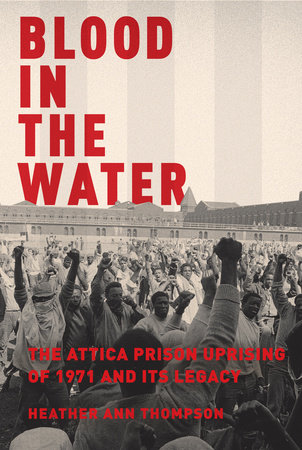Announcement: AAIHS/JCHR Roundtable on Heather Ann Thompson’s Blood in the Water

January 22-27, 2017
The African American Intellectual History Society (AAIHS)’s blog–Black Perspectives—is collaborating with the Journal of Civil and Human Rights (JCHR) to host a roundtable on Heather Ann Thompson’s Blood in the Water. The online segment of the roundtable begins on Sunday, Jan. 22, 2017 and concludes on Friday, Jan. 27, 2016. Printed (and extended) versions of the responses will be published in the JCHR in May 2017.
Moderated by Mike Ezra (Sonoma State University), the roundtable will feature responses from Kali Nicole Gross (Wesleyan University); Robert Chase (Stony Brook University); Danielle McGuire (Wayne State University); Dan Berger (University of Washington, Bothell); LaShawn D. Harris (Michigan State University); and Russell Rickford (Cornell University). Heather Ann Thompson (University of Michigan) will offer concluding remarks.
During the week of the online roundtable, Black Perspectives will publish new blog posts every day at 5:30AM EST. Please follow AAIHS (@AAIHS) and Black Perspectives (@BlkPerspectives) on Twitter; like us on Facebook; or subscribe to our blog for updates. By subscribing to Black Perspectives, each new post will automatically be delivered to your inbox during the week of the roundtable.
Heather Ann Thompson
 Dr. Heather Ann Thompson is a native Detroiter currently on faculty of the University of Michigan in Ann Arbor. Thompson has just completed the first comprehensive history of the Attica Prison Rebellion of 1971 and its legacy for Pantheon Books. This book is slated for a Summer 2016 release in time for the 45th anniversary of the Attica rebellion. To recover this story Thompson has immersed herself in legal, state, federal, prison, and personal records related to the Attica uprising and its aftermath (some never-before-seen) located in archives, governmental institutions, and various individual collections around the country and the world. With these varied and rich resources she seeks to recapture the full, dramatic, gripping, multi-faceted, and complex story that was Attica, and hopes to underscore for readers everywhere this event’s historical as well as contemporary importance.
Dr. Heather Ann Thompson is a native Detroiter currently on faculty of the University of Michigan in Ann Arbor. Thompson has just completed the first comprehensive history of the Attica Prison Rebellion of 1971 and its legacy for Pantheon Books. This book is slated for a Summer 2016 release in time for the 45th anniversary of the Attica rebellion. To recover this story Thompson has immersed herself in legal, state, federal, prison, and personal records related to the Attica uprising and its aftermath (some never-before-seen) located in archives, governmental institutions, and various individual collections around the country and the world. With these varied and rich resources she seeks to recapture the full, dramatic, gripping, multi-faceted, and complex story that was Attica, and hopes to underscore for readers everywhere this event’s historical as well as contemporary importance.
While completing this history of the Attica Uprising, Thompson has written numerous popular as well as scholarly articles on the history of mass incarceration as well as its current impact. These include pieces for the New York Times, Time Magazine, The Atlantic, Salon.com, Dissent, New Labor Forum, as well as the award-winning articles: “Why Mass Incarceration Matters: Rethinking Crisis, Decline and Transformation in the Postwar United States,” Journal of American History (December 2010), and “Rethinking Working Class Struggle through the Lens of the Carceral State: Toward a Labor History of Inmates and Guards.” Labor: Studies in the Working Class History of the Americas (Fall, 2011). Thompson’s recent piece in the Atlantic Monthly on how mass incarceration has distorted democracy in America was named a finalist for the best magazine article of 2014 award from the National Council on Crime and Delinquency.
About the Book
On September 9, 1971, nearly 1,300 prisoners took over the Attica Correctional Facility in upstate New York to protest years of mistreatment. Holding guards and civilian employees hostage, the prisoners negotiated with officials for improved conditions during the four long days and nights that followed.
On September 13, the state abruptly sent hundreds of heavily armed troopers and correction officers to retake the prison by force. Their gunfire killed thirty-nine men—hostages as well as prisoners—and severely wounded more than one hundred others. In the ensuing hours, weeks, and months, troopers and officers brutally retaliated against the prisoners. And, ultimately, New York State authorities prosecuted only the prisoners, never once bringing charges against the officials involved in the retaking and its aftermath and neglecting to provide support to the survivors and the families of the men who had been killed.
Drawing from more than a decade of extensive research, historian Heather Ann Thompson sheds new light on every aspect of the uprising and its legacy, giving voice to all those who took part in this forty-five-year fight for justice: prisoners, former hostages, families of the victims, lawyers and judges, and state officials and members of law enforcement. Blood in the Water is the searing and indelible account of one of the most important civil rights stories of the last century.
*The Journal of Civil and Human Rights is a peer-reviewed, interdisciplinary, academic journal dedicated to studying modern U.S.-based social justice movements and freedom struggles, including transnational ones, and their antecedents, influence, and legacies. The journal features an editor’s note, research-based articles, interviews, editorials, state-of-the-field pieces, and book forums.
Copyright © AAIHS. May not be reprinted without permission.